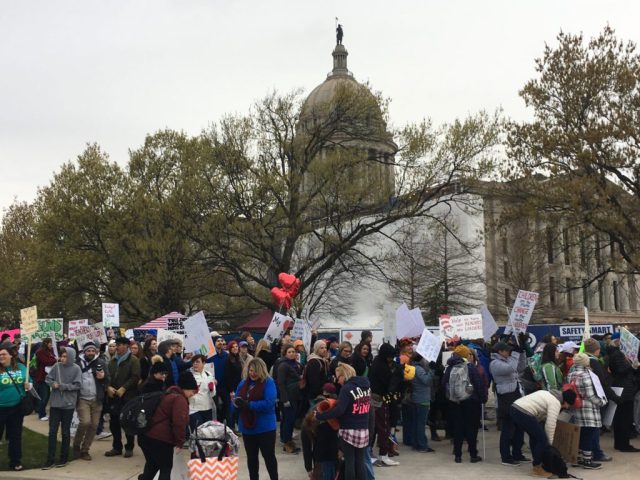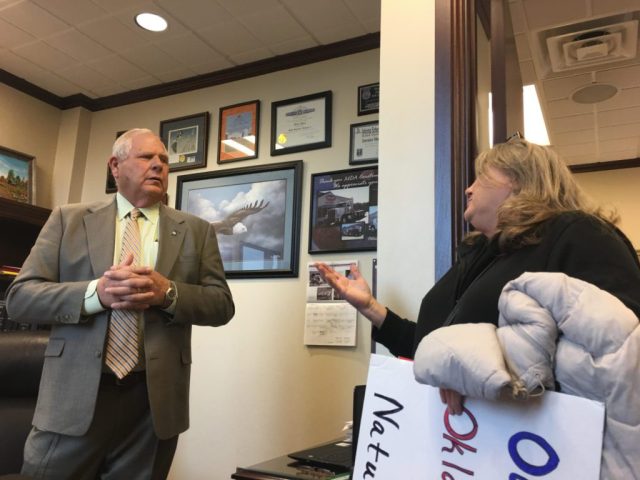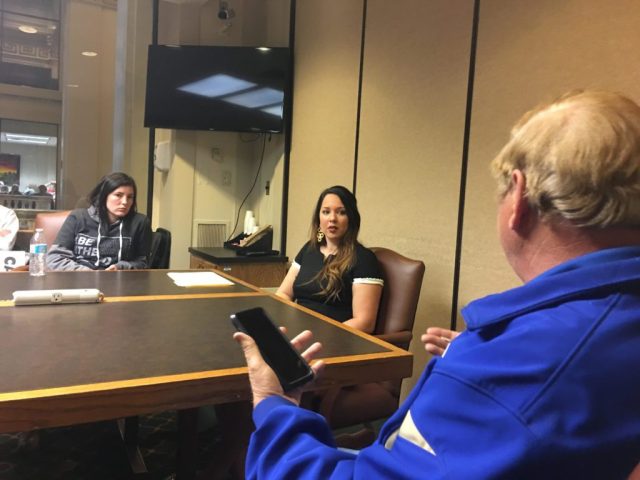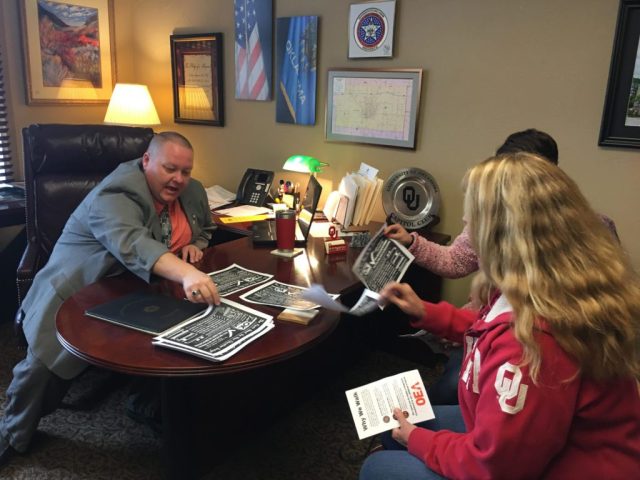

Teachers picket in front of the Oklahoma Capitol building Monday, April 2, 2018. BRIANNA BAILEY/The Frontier
Hands clasped, standing in front of the framed print of a bald eagle that hangs over his desk, Sen. Mark Allen did his best to explain things to the small but determined mob of teachers in his office on Monday.
The teachers tried to explain some things, too.
“That’s how we fund things — that’s how we raise funds — taxes,” teacher Fonda Clopton said, shaking her poster board sign in the doorway of the senator’s office.
Clopton, who teaches science and art for Pocola Public Schools near the Arkansas border, makes about $29,000 a year after 18 years of teaching.
Allen, R- Spiro, voted against a historic $447 million revenue package last week that gave teachers in the state a $6,100 pay raise.
And on Monday his constituents had come to collect.
Wearing frowns and protest signs around their necks, thousands of teachers from across the state paid their state lawmakers a visit on Monday, sometimes waiting in long lines for just a few minutes of sometimes tense meetings.
Security lines to enter the Capitol backed up across the building’s grounds as thousands of teachers who arrived via carpool and chartered bus picketed outside.

Sen. Mark Allen, R-Spiro, meets with teacher Fonda Clopton at his office Monday, April 2, 2018. BRIANNA BAILEY/The Frontier
Gov. Mary Fallin was not in her office Monday to meet with teachers, although many signed in at her office and requested a meeting.
According to her official schedule, Fallin was set to attend a meeting at the Oklahoma Department of Transportation on Monday morning.
She issued a statement late Monday afternoon that said she looked forward “to continuing to talk” with legislators and teachers.
“I appreciate teachers coming to the Capitol today to talk with their elected officials. During the past three years, I have called for an increase in teacher salaries. I was very proud to join with leaders of both parties to sign the largest teacher pay increase in Oklahoma’s history. This legislation will provide an average teacher pay raise of $6,000 to our teachers. That is a 16 percent average pay increase for teachers. An additional $50 million was allocated for the state aid funding formula and textbooks. In total, this represents a 19.74 percent increase in the appropriations for public schools,” the statement read.
“Just like Oklahoma families, we are only able to do what our budget allows. Significant revenue-raising measures were approved to make this pay raise and additional school funding possible. We must be responsible not to neglect other areas of need in the state such as corrections and health and human services as we continue to consider additional education funding measures. I look forward to continuing to talk with legislative leaders and teachers as we forge a positive pathway forward for education.”
Teacher asks lawmaker: ‘What are your answers’
Allen sits on both the Senate appropriations and education committees, and opposes most tax increases. At one point during the contentious teacher meeting, he suggested the educators give their pay raises back to fund schools if they were unhappy with the bill the Legislature has passed.
The revenue package, House Bill 1010xx, is the first tax increase approved by the Oklahoma Legislature in 28 years. But it was was too little too late according to many of the teachers at the Capitol. They want more school funding, smaller class sizes and more money for textbooks.
“That’s why I voted against it — the teacher pay raise is not going to help the school funding situation,” Allen said.
“What are your answers, I’d like to know,” Clopton asked.
Allen opposes raising the capital gains tax.
“There’s a lot of people who invest their money and live off their retirement,” he said.
He’s also against raising the gross production tax rate — oil and gas companies could choose to drill elsewhere, he said.
He opposes raising taxes on cigarettes, too.
“I’ve always supported education, but a cigarette tax hurts small business,” Allen said.

Rep. Tess Teague, R-Choctaw, meets with teachers and students Monday, April 2, 2018, at the Oklahoma Capitol. BRIANNA BAILEY/The Frontier
Rep. Tess Teague, R-Choctaw, who also voted against HB1010xx, held meetings with teachers and students from her district in a conference room at the Capitol on Monday, where she apologized for describing teachers as a “squeaky wheel” during a floor debate over the revenue package last week.
“I’m not above apologizing,” Teague told teachers on Monday. “… it was taken out of context. I did not mean to be disrespectful. I never intended it to be derogatory.”
Teague debated against the bill and said the passage of the revenue-raising measure was “a sad day for Oklahoma.”
She believes consolidating school district administration and cutting government “fraud, waste and abuse” are better solutions to educational funding than tax increases.
Her constituents have told her they don’t want to pay more taxes, she said.
“We are hemorrhaging — we are bleeding out,” Teague said. “We didn’t just go broke overnight, we’ve been giving away money like it’s candy.”
No guarantees against future education cuts
Rep. Dell Kerbs, R-Shawnee, greeted teachers from his district with cheese cubes and apple slices, ready to chat about Oklahoma’s constitutional mandate to keep a balanced budget.
“The state produces no income — it all comes out of our pockets,” he said from his third-floor office overlooking the teacher picket line.

Rep. Dell Kerbs, R-Shawnee, meets with support staff from Bethel Public Schools at his office Monday, April 2, 2018. BRIANNA BAILEY/The Frontier
Taking a step back, it’s remarkable Oklahoma went from facing a nearly $1 billion budget shortfall a few years ago to passing a historic revenue package this spring that will make teacher pay more competitive in the region, he told a group of teachers gathered in his office.
“What we are battling again is 10 years of multiple inefficiencies,” Kerbs said.
The educators told Kerbs about growing special education class sizes and shortages so dire that teachers are afraid to let their kids take their textbooks home.
Restored funding of $33 million for textbooks simply isn’t enough to cover basic classroom needs, several teachers said.
“We haven’t had one dollar for our library in four years,” said Stacey Wilson, a library aide from Bethel Public Schools who met with Kerbs on Monday.
Kerbs gave teachers who visited his office a photocopied flyer outlining in the $2.9 billion in new funding for education, about $480 million next fiscal year.
But the teachers want assurances the funding won’t disappear in future budget years.
Though the Legislature has set a new baseline for funding in the state, there is no dedicated source of money to fund those increases.
“We need some guaranteed money,” Erin Herron, a paraprofessional special education teacher for Bethel Public Schools told Kerbs.
It’s true that if the price of oil and gas goes down, state revenue could take another hit in future years, Kerbs said.
“If we see revenue shortfalls, then yes, everyone could take a cut,” Kerbs said.

